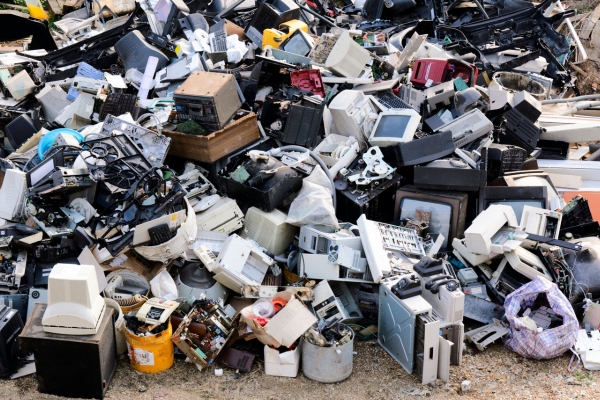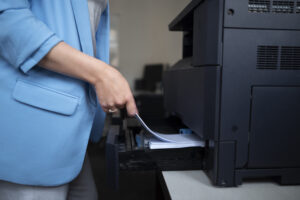The benefits of recycling electronics go far beyond just clearing out clutter. Electronics recycling is the process of collecting and processing old devices, like computers, phones, and TVs, so that their materials can be reused safely. It’s a smarter alternative to dumping them in landfills where they leak toxic waste into the environment.
With how fast technology evolves, e-waste is now one of the fastest-growing waste streams in the world.
People upgrade phones every 1-2 years, businesses replace tech in cycles, and devices pile up fast. According to the Global E-Waste Monitor, the world generated over 50 million metric tons of e-waste in a single year, and less than 20% was formally recycled.
Why Electronics Recycling Is So Important
Reduces Environmental Pollution
Electronics often contain toxic elements like lead, mercury, and cadmium. When dumped in landfills, these materials can seep into the ground, polluting the soil and nearby water sources. Recycling electronics properly keeps these harmful substances out of our environment.
It’s not just about the planet—it’s about people too. Pollution from improperly disposed of electronics can affect entire communities.
Conserves Natural Resources
Many devices are built with rare earth elements, copper, gold, aluminum, and other valuable materials. Mining for these resources is destructive and energy-intensive. By recycling electronics, we recover these materials and reduce the need to extract new ones.
This helps extend the life of finite resources and supports a more sustainable supply chain.
Minimizes Energy Consumption
Recycling takes significantly less energy than producing materials from raw resources. For example, extracting aluminum from recycled sources uses about 95% less energy than mining it new sources.
That energy savings adds up across millions of devices and contributes to a smaller carbon footprint for tech production.
Protects Human Health
Improperly managed e-waste—especially in countries without strong regulations—exposes people to hazardous chemicals through burning, dismantling, and direct contact.
Recycling through certified programs ensures these materials are handled safely, reducing health risks to workers, communities, and future generations.
The Global Impact of Improper E-Waste Disposal
The benefits of recycling electronics become even clearer when you look at what happens when devices aren’t recycled properly. Tossing electronics in the trash doesn’t just waste valuable materials—it causes real harm on a global scale.
E-Waste Stats and Trends
Electronic waste is piling up at an alarming rate. According to the Global E-Waste Monitor, the world produces over 50 million metric tons of e-waste every year—and that number is expected to keep rising.
E-waste is now the fastest-growing waste stream worldwide, fueled by short product life cycles, constant tech upgrades, and increased consumer demand.
Informal Recycling in Developing Countries
Much of the world’s discarded electronics end up in developing countries, where they’re processed through informal or unsafe methods. In places like Agbogbloshie, Ghana, e-waste is often burned to extract valuable metals, releasing toxic fumes into the air.
This puts workers, many of them children, at serious risk, while polluting the surrounding environment and water systems.
Cybersecurity Risks
Throwing away or donating electronics without wiping them properly can lead to serious data breaches. Old hard drives, phones, and even printers can still contain personal, financial, or business data.
If these devices fall into the wrong hands, the consequences can include identity theft, financial fraud, or business liability. Responsible recycling includes secure data destruction to eliminate this risk.
The Benefits of Responsible Electronics Recycling
When done right, electronics recycling isn’t just safe—it’s smart. The benefits of recycling electronics go well beyond waste reduction and help create a cleaner, more efficient economy.
Supports a Circular Economy
Recycling allows valuable materials like copper, aluminum, and rare earth elements to be recovered and reused in new products. This reduces the need for fresh mining and keeps resources in use longer.
It’s a key part of the circular economy—an economic model that focuses on sustainability and eliminating waste.
Job Creation and Green Innovation
The electronics recycling industry is growing fast, creating new jobs in logistics, processing, and engineering. It’s also sparking innovation in areas like AI-powered sorting, robotic disassembly, and chemical-free recovery methods.
These advancements make recycling more efficient and scalable, benefiting both the economy and the planet.
Corporate Responsibility and Brand Reputation
For businesses, recycling electronics is more than just good practice—it’s smart branding. Consumers care about sustainability, and companies that prioritize eco-friendly policies stand out.
Plus, responsible recycling helps businesses stay compliant with environmental regulations, avoid fines, and build trust with customers and stakeholders.
How to Recycle Electronics Properly
When it comes to getting rid of old tech, the benefits of recycling electronics only count if you do it the right way. Dumping devices in the trash or handing them off to the wrong people can do more harm than good.
Here’s how to make sure your electronics are recycled safely and responsibly.
Use Licensed Recyclers
Not all recycling companies are created equal. Look for licensed recyclers like EACR Inc., a top electronics recycling company known for responsible handling, secure data destruction, and full compliance with environmental regulations.
Certified facilities like these follow strict standards to protect both people and the planet.
What Can Be Recycled?
Most electronics you use every day can be recycled, including:
- Laptops and desktops
- Cell phones and tablets
- Printers and fax machines
- Monitors and TVs
- Keyboards, mice, and cables
- Servers and network gear
Do not throw electronics in your regular trash bin—especially if they contain batteries or hazardous components. These items can leak chemicals and cause fires or pollution when mixed with regular waste. Check out our in-depth list of acceptable items to recycle.
Tips for Safe Disposal
Before recycling your electronics, follow a few smart steps:
- Back up and wipe your data: Use factory reset tools or data wiping software to protect your information.
- Remove batteries: Some recycling centers require batteries to be removed in advance.
- Call ahead: Contact your recycler to confirm which items are accepted and if there are drop-off rules or fees.
A little prep goes a long way toward responsible disposal.
Final Thoughts
The urgency of electronics recycling isn’t just about clutter—it’s about protecting our environment, conserving resources, and keeping people safe. The benefits of recycling electronics are far-reaching, but only if we take them seriously.
Whether you’re cleaning out your home office or managing IT waste for a business, it’s up to all of us to handle electronics responsibly. Choose certified recyclers, spread the word, and make smarter decisions about what you toss and where it goes. Contact EACR Inc. today and learn how we can help you reduce e-waste.





